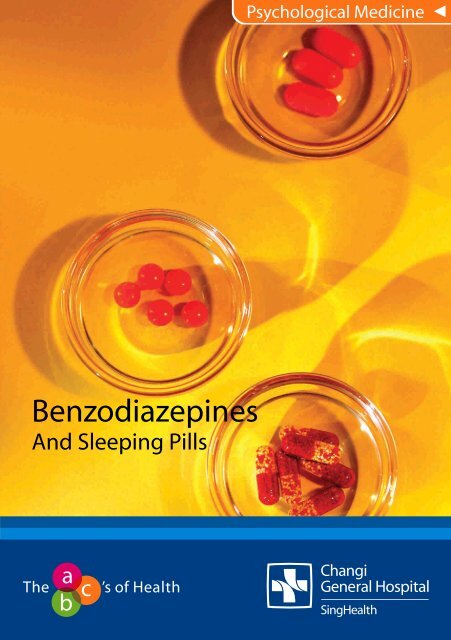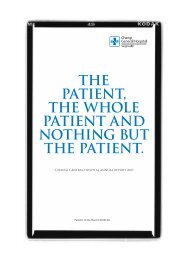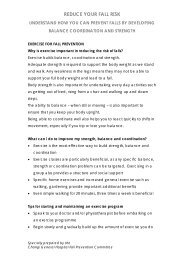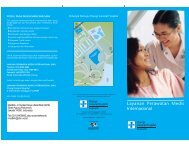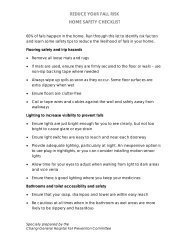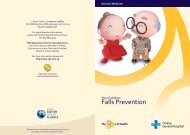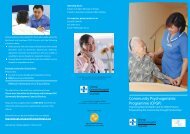Benzodiazepines - Changi General Hospital
Benzodiazepines - Changi General Hospital
Benzodiazepines - Changi General Hospital
You also want an ePaper? Increase the reach of your titles
YUMPU automatically turns print PDFs into web optimized ePapers that Google loves.
<strong>Benzodiazepines</strong><br />
And Sleeping Pills<br />
Psychological Medicine
Introduction<br />
<strong>Benzodiazepines</strong> are a type of medication prescribed by doctors for<br />
its therapeutic actions in various conditions such as stress and anxiety;<br />
sleeping problems; muscle tension; as an anaesthetic before surgery<br />
as well as treatment for epilepsy and alcohol withdrawal. They are<br />
also known as “minor tranquillisers” but this does not mean that they<br />
are mild or harmless.<br />
There are different kinds of “benzos” that vary in strength and the<br />
duration of its effect in the body. They go by either the generic drug<br />
name or the brand name used by each drug company. Commonly<br />
used benzodiazepines include:<br />
- diazepam (e.g. Valium)<br />
- alprazolam (e.g. Xanax)<br />
- midazolam (e.g. Dormicum)<br />
- nitrazepam (e.g. Mogadon)<br />
- lorazepam (e.g. Ativan)<br />
- bromazepam (e.g. Lexotan)<br />
- clonazepam (e.g. Rivotril)<br />
Besides benzodiazepines, there are other types of sleeping pills<br />
such as:<br />
- zopiclone (e.g. Imovane)<br />
- zolpidem (e.g. Stilnox)<br />
Some people use benzodiazepines illegally or at excessive doses for<br />
non-medical purposes to feel “high”. Some drug addicts turn to them<br />
when they cannot obtain heroin or to increase the effect of heroin.<br />
Those that use stimulants such as ecstasy may use benzodiazepines<br />
to help when they are “coming down”.<br />
2
<strong>Benzodiazepines</strong> depress or slow down the central nervous system<br />
and can induce relaxation and calmness in the short term. However<br />
they do not cure anxiety or mood disorders; neither do they solve<br />
the problems that caused these conditions in the first place. They<br />
also have a wide range of unwanted side effects, especially when<br />
misused.<br />
Side effects of benzodiazepines and<br />
sleeping pills<br />
At lower doses, the immediate effects include mild impairment of<br />
thought processes, memory and motor coordination; drowsiness;<br />
tiredness and lethargy; dizziness; blurred vision. There may also be<br />
dry mouth, tremors, nausea and vomiting, loss of appetite, constipation<br />
or diarrhoea. Feelings of euphoria and sometimes of emotional<br />
isolation and depression can occur.<br />
At higher doses there may be over-sedation, with an effect similar to<br />
that of alcohol – disinhibition (doing things you normally would not<br />
do), confusion, slurred speech, poor coordination, double vision,<br />
impaired judgment, difficulty thinking clearly, mood swings, impulsive<br />
and aggressive behaviour. The unwanted negative effect of reduced<br />
coordination makes it dangerous to drive or operate machinery.<br />
3
In combination with alcohol or other<br />
illegal drugs, there is a high risk of drug<br />
interaction, overdose and death. This is<br />
because very high doses of<br />
benzodiazepines can cause respiratory<br />
depression, unconsciousness or coma.<br />
Injecting them can be very dangerous<br />
and result in serious medical<br />
complications such as collapsed veins,<br />
infected skin, amputation of limbs due to<br />
poor circulation, damage to organs, stroke<br />
and even death. There is a risk of<br />
contracting diseases such as hepatitis B,<br />
hepatitis C and HIV, if needles and syringes are shared.<br />
<strong>Benzodiazepines</strong> are known to adversely affect the baby’s<br />
development in the womb if a mother consumes them during<br />
pregnancy, leading to physical defects. They can be passed from<br />
mother to baby through breast milk and have sedative effects, as the<br />
baby’s body is unable to process them quickly.<br />
Long term effects of excessive usage include muscle weakness, skin<br />
rashes, weight gain, increased risk of accidents, increased risk of falling<br />
over (especially in older people), sexual problems, menstrual<br />
irregularities, headaches, difficulty sleeping and nightmares, fatigue<br />
and lack of motivation, personality changes, anxiety, irritability,<br />
paranoia and depression.<br />
4
How does a person know he or she has a<br />
problem with the use of benzodiazepines<br />
or sleeping pills?<br />
One sign is that work or studies is affected<br />
e.g. mistakes made at work or in school and<br />
lateness or absenteeism because of unwanted<br />
effects. Other negative effects that are seen<br />
include damage to family or social life,<br />
finances, physical and emotional health as<br />
well as trouble with the law e.g. rash driving<br />
after taking benzodiazepines.<br />
Some people may start to consume more so as to achieve the same<br />
effect the benzodiazepines had on them at an earlier stage. They may<br />
not be able to control their usage, even when they wish to. For these<br />
people, stopping suddenly can lead to withdrawal symptoms. They<br />
may also have craving and urges, which are difficult to resist.<br />
Withdrawal symptoms can be mild in some people but severe in<br />
others. These unpleasant sensations eventually disappear as the body<br />
adjusts to functioning without the benzodiazepines. These symptoms<br />
commonly include headaches; muscle ache or twitching; numbness;<br />
tingling sensations; tremor; faintness; sweating; nausea, vomiting and<br />
abdominal pains; bizarre dreams; insomnia; fatigue; poor concentration<br />
and memory; feeling tense and irritable; altered perception and<br />
heightening of senses (such as hypersensitivity to noise, light and<br />
touch).<br />
If severe, there can be confusion, hallucinations, seizures and paranoia.<br />
This is more likely to happen if you stop the medication abruptly after<br />
long term use of high doses.<br />
5
What is the treatment for excessive use of<br />
these medications?<br />
The first step is to admit that you may<br />
have a problem. Try to understand<br />
what motivates you to change your<br />
habit of using benzodiazepines<br />
excessively.<br />
It is important not to suddenly stop taking them without first seeing<br />
a doctor. A visit to your doctor can be useful for support and advice.<br />
This is because benzodiazepines have different potency and speed<br />
of elimination. Your doctor can also carry out a health assessment for<br />
you and discuss a medically supervised withdrawal plan with you. It<br />
may include switching over to a longer-acting benzodiazepine over<br />
a period of time before finally tapering off. A slow reduction in dose<br />
over time (by about 10% per week) is recommended to reduce the<br />
severity of the withdrawal symptoms.<br />
If anxiety or insomnia recurs, this may be part of withdrawal and not<br />
re-emergence of the underlying anxiety or sleep disorder. These<br />
withdrawal symptoms will eventually go away.<br />
It is helpful to consult a substance abuse counsellor or to attend<br />
regular group support meetings. Remember, there are many ways to<br />
deal with anxiety and insomnia without using benzodiazepines, such<br />
as relaxation, stress management, counselling, a healthy diet and<br />
exercise. The risk of relapse is less with ongoing participation in<br />
counselling or support groups. Consult your doctor if you have<br />
persistent anxiety or depression, to find out if you are suffering from<br />
an anxiety or mood disorder that requires further treatment.<br />
6
Tips on how to reduce harm from<br />
benzodiazepines or sleeping pills<br />
• Take only those prescribed by your doctor<br />
and do not take more than prescribed.<br />
• <strong>Benzodiazepines</strong> should be used as short<br />
term medication for medical reasons only.<br />
• Avoid using them on a daily basis for more<br />
than two weeks at a time.<br />
• Always seek medical advice before cutting<br />
down.<br />
• Do not mix benzodiazepines with other<br />
drugs, especially depressants such as alcohol<br />
and opiates (including heroin).<br />
• Seek medical advice immediately if you become pregnant while<br />
using benzodiazepines.<br />
If you (or a friend) have a problem with benzodiazepine use, please contact:<br />
1. Addiction Medicine Clinic, <strong>Changi</strong> <strong>General</strong> <strong>Hospital</strong><br />
(For treatment of alcohol, benzodiazepine and gambling addiction only)<br />
2 Simei Street 3<br />
Singapore 529889<br />
Consultation by appointment only. Please call: 6850 3333.<br />
2. Community Addictions Management Programme (CAMP),<br />
Institute of Mental Health<br />
10 Buangkok View<br />
Singapore 539747<br />
Consultation by appointment only. Please call: 6389 2200.<br />
3. Recovery Support Group Meetings<br />
WE Centre for Addictions Recovery and Education<br />
620 Tiong Bahru Road<br />
Singapore 158789<br />
For enquiries, please call 6471 5346 (answering machine).<br />
Email: admin@wecare.org.sg<br />
7
For appointments and enquiries,<br />
please call CGH Appointment Centre at<br />
Tel: (65) 6850 3333<br />
CGH Appointment Centre operating hours:<br />
8.30 am to 8.00 pm (Monday to Friday)<br />
8.30 am to 12.30 pm (Saturday & Sunday)<br />
Closed on Public Holidays<br />
For more information, please visit<br />
http://www.cgh.com.sg<br />
2 Simei Street 3 Singapore 529889<br />
Tel: 6788 8833 Fax: 6788 0933 www.cgh.com.sg<br />
Reg No 198904226R<br />
All information is valid at the time of printing (November 2008)<br />
and subject to revision without prior notice.<br />
Organisation Accredited by<br />
Joint Commission International


